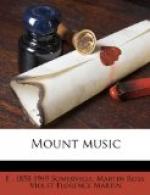CHAPTER XI
In the years that followed, “Larry’s cads” came to be, for the young Talbot-Lowrys, a convenient designation for the friends into whose bosom Providence had seen fit to fling their cousin. But Larry never either approved or accepted it. He was entirely pleased with his new friends, and especially with that son of the house whose position he had usurped, Mr. Bartholomew Mangan.
Barty was a lengthy, languid, gentle youth, of nearly nineteen, darkly, pallidly handsome, sweet natured, and slovenly, like his mother, and, unlike her, poetical, idealistic, unpractical, shy, and self-conscious. He was, at this period, working in the office of one of the two solicitors, who, with the aid of a branch of a bank, a Petty Sessions Court, and the imposing, plate-glass bow-windows of Hallinan’s hotel, enabled Cluhir to convince itself of its status as a town. Further proof of the civic importance of Cluhir was found in the existence of a debating club of very advanced political views among its young men, of which Barty Mangan was secretary. Its membership, if small, was select, since its Republican principles did not compel it to admit to its privileges shop-assistants, or artisans, while they automatically excluded members of the class that were usually referred to in the club discussions as “Carrion Crows,” or if the orator’s mood was mild, “the garrison.” In Ireland the attitude of mind that is termed, alternately, Disloyalty or Patriotism, is largely a matter of class, and Barty Mangan’s introduction of Master St. Lawrence Coppinger, as an honorary member of the club, partook of the nature of a shock to those of the faithful who were present at his first appearance in the club room, a severely plain apartment, that offered no impediment in the matter of luxury to high thinking. But the faithful of the “Sons of Emmet” Club had nothing to fear from this half-fledged young Carrion Crow. The English school to which Larry had been sent had dulled the fire lit by the poems of The Spirit of the Nation, but it had not extinguished it. It had flickered for a time, during which Hunting had superseded Patriotism, and Mr. Jorrocks had reigned alone; but the oratory of the Sons of Emmet, to which Larry was now privileged to listen, had had the effect of restoring to life and vigour the long-neglected, half-forgotten tenets of the Companionage of Finn. Larry’s store of enthusiasm was quite equal to supplying motive power for running two engines; hunting still held its own, and after a club debate in which he had taken an energetic part, even the most exclusive of the Sons of Emmet admitted that Barty’s importation was worthy of the privilege that had been extended to him.




